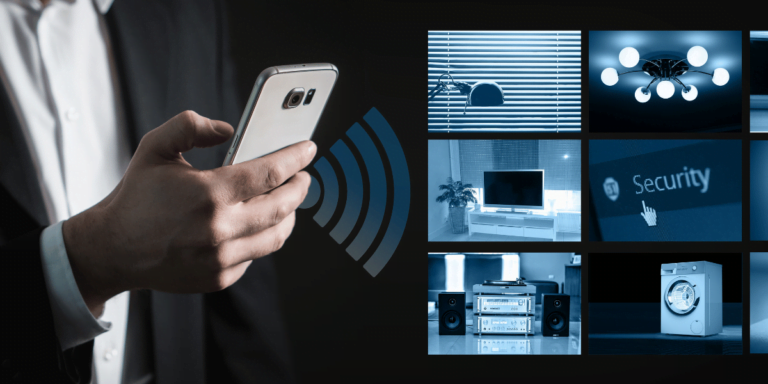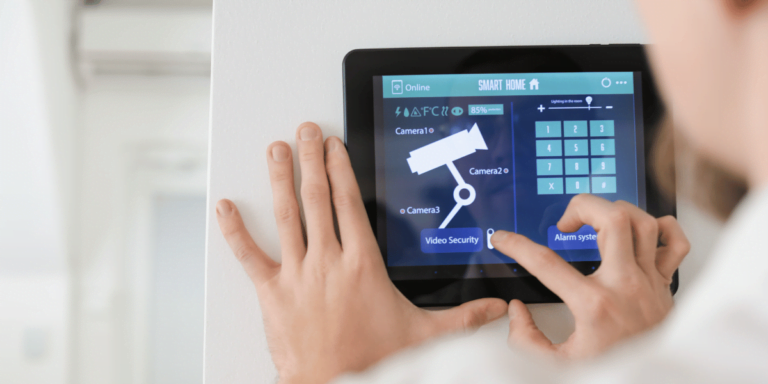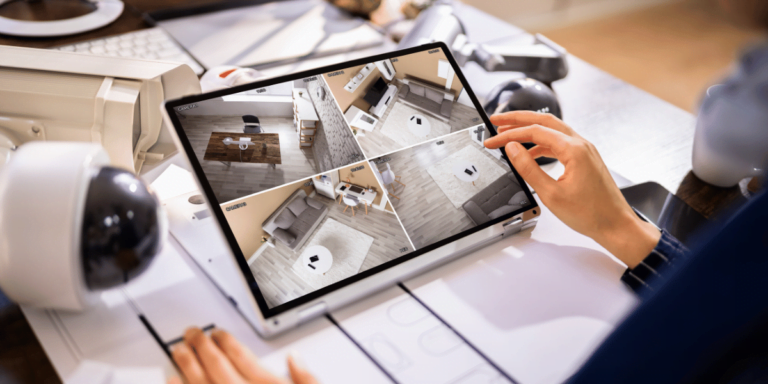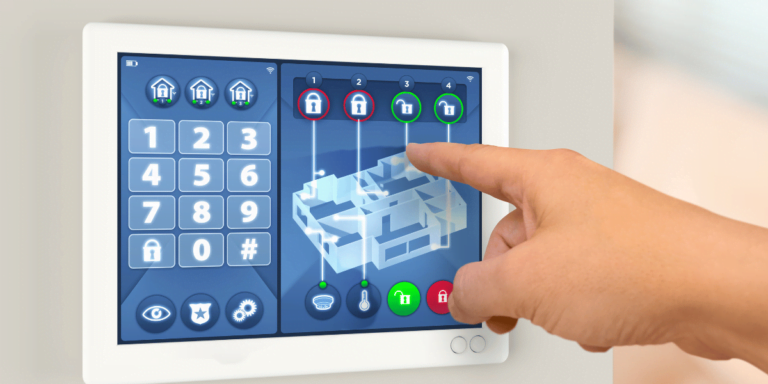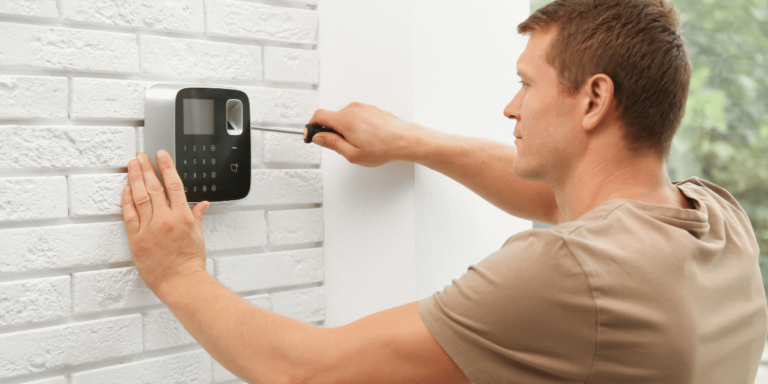Home security systems In today’s world, keeping your home safe is crucial. Home security systems are key for homeowners wanting to protect their families, stuff, and peace of mind. They act as a strong shield against threats, giving you control and peace of mind.
Getting a home security system does more than just stop burglars. It also keeps your property safe, scares off intruders, and works well with your smart home tech. With features like 24/7 monitoring, remote access, and mobile app control, these systems make keeping your home safe easy and effective.
When picking a home security system, think about what you need and how much you can spend. Basic systems cost between $150 and $300. But, if you want more devices, like 10 or more, it could be up to $1,000 or more. Some systems need a monthly fee for monitoring, while others let you monitor yourself and cost less upfront.
It’s also important to check if the system works with smart home systems like Alexa and Google Home. Many systems now work with these, letting you control your security and other devices easily for a smooth experience.
Key Takeaways:
- Home security systems provide comprehensive protection for your property and loved ones
- Investing in a security system offers benefits beyond burglary prevention, including smart home integration and remote access
- Starter systems range from $150 to $300, while more advanced setups can cost $1,000 or more
- Consider factors like monitoring options, contract requirements, and compatibility with smart home ecosystems when choosing a system
- Home security systems provide peace of mind and a sense of control over your home’s safety
The Importance of Home Security
Today, keeping your home safe is more important than ever. In 2022, there were over 885,000 burglaries in the U.S., causing losses of more than $44 billion. A good home security system protects your property, keeps your family safe, and gives you peace of mind.
Safeguarding Your Family and Belongings
Your home should be the safest place for you and your family. A good home security system watches over your property all the time. It alerts you to any dangers. With door and window sensors, motion detectors, and glass break sensors, you can be sure your family and things are safe from intruders.
A study by Rutgers University found that more home security systems mean fewer burglaries, even if you don’t have one.
Deterring Potential Intruders
A home security system stops burglars from coming near your home. Things like yard signs, cameras, and alarms make burglars think twice. In fact, 80% of burglars won’t try to break into a house with an alarm. Having an alarm makes 60% of burglars decide not to target your home.
Peace of Mind for Homeowners
Getting a home security system gives you peace of mind. You know your home and family are safe, so you can relax. With remote monitoring, you can check on your home and control devices from your phone, even when you’re away.
This security also helps you stay productive, healthy, and focused. It includes smoke and carbon monoxide detection and medical alerts, so you’re ready for emergencies.
| Home Security Benefits | Statistics |
|---|---|
| Deter potential intruders | 80% of burglars check for alarms before attempting a break-in |
| Safeguard family and belongings | Over 70% of burglaries occurred on residential properties in the US in 2022 |
| Lower homeowner’s insurance | Having a home security system can lower insurance by up to 20% |
| Provide peace of mind | Remote monitoring capabilities allow homeowners to view live feeds and control devices from their phones |
Home security is more than just protecting your stuff. It’s about keeping your family safe and sound. With smart home features and remote access, modern systems give you control and convenience. Don’t wait to protect your loved ones. Get a good home security system now.
Types of Home Security Systems
Choosing the right security system is key to protecting your home and loved ones. There are many options out there. It’s important to know the different types to make a good choice. You’ll find everything from wired to wireless, DIY to professional installation, and monitored to unmonitored systems.
Wired vs. Wireless Systems
Security systems can be wired or wireless. Wired systems use wires to send power and information, giving a stable connection. They’re harder to install and might need a pro’s help. Wireless systems work over the internet, making them flexible and easy to set up. They’re great for renters or those who want to add more devices later.
DIY vs. Professional Installation
Decide if you want a DIY or professional security system. DIY systems, like the Ring Alarm Pro, are easy to install yourself and come with clear instructions. They’re perfect for those who like to do things themselves and want to save money. Professional installation means your system is set up right for your home’s needs. Companies like ADT offer this service, ensuring your system works well.
Monitored vs. Unmonitored Systems
Monitored systems connect to a professional center that watches your home all the time. If an alarm goes off, the center checks it and calls emergency services if needed. Ring Alarm Pro, for example, has a Pro Protect Plan for $20 a month, with fast response times. Unmonitored systems use apps and alerts for you to watch over your home. They’re cheaper but need you to stay alert.
| Security System | Price | Installation Time | Monitoring |
|---|---|---|---|
| Ring Alarm Pro | $300 | Under 1 hour | Professional (with Pro Protect Plan) |
| Abode Smart Security Kit | $279 ($160 at Goabode) | DIY | Self-monitoring |
| Blue by ADT | $195 (base plan) | Professional | 24/7 professional monitoring ($25/month) |
When picking a home security system, think about what you need and like. Look at your budget, home size, and how much you want to do yourself. Knowing the different types helps you choose the best for your home and family. Don’t forget to check out exclusive furniture options that go well with your security system, making your home safe and stylish.
Key Components of a Home Security System
A home security system has many important parts that work together to protect your home. These include control panels, sensors, cameras, and alarms. Knowing what each part does helps homeowners pick the right security system for their needs.
Control Panels
The control panel is the heart of a home security system. It manages all the connected parts like sensors, cameras, and alarms. Homeowners can use it to turn the system on or off, check activity, and get alerts for threats.
Modern control panels are easy to use and can be controlled from anywhere with a mobile app or web portal. This makes it easy to keep an eye on your home.
Sensors (Door, Window, Motion)
Sensors are key to catching intruders or unauthorized entry. There are three main types:
- Door sensors: These alert the system when a door is opened while armed.
- Window sensors: They do the same for windows, alerting the system if opened or tampered with.
- Motion sensors: These use infrared to detect movement and trigger an alarm if someone is there.
Most home security systems, over 80%, have motion sensors. Entry sensors are often used on doors and windows on the ground floor. These sensors break a circuit when opened, setting off the alarm.
Security Cameras
Security cameras are crucial for watching over your home. They can be inside or outside to catch activity and scare off intruders. Today’s cameras have high-definition recording, night vision, motion detection, and can be watched on mobile apps.
They’re great for proving what happened if there’s a break-in. This can be very helpful for legal reasons.
| Camera Feature | Description |
|---|---|
| 1080p HD Recording | Provides clear and detailed video footage for enhanced surveillance |
| Night Vision | Enables cameras to capture clear images in low-light conditions |
| Motion Detection | Triggers recording and alerts when movement is detected in the camera’s field of view |
| Remote Viewing | Allows homeowners to access live or recorded video feeds through mobile apps or web portals |
Alarms and Sirens
Alarms and sirens make loud noises to alert homeowners and neighbors to security issues. When a sensor spots an intruder, it sets off the alarm. This loud noise can scare off intruders and get a quick homeowner response.
Some systems also have smart smoke and carbon monoxide detectors. They tell you out loud what the threat is, helping you act fast.
Home security systems can also include glass break detectors, panic buttons, key fobs, and signs or stickers for the yard. These add more protection and make burglars think twice. By using these parts, homeowners can make a strong security plan that fits their needs.
Smart Home Integration
In today’s world, smart home security systems are key for home automation. They work with many smart devices, letting homeowners control their security and other smart home features. You can manage your home’s security easily with remote access and a mobile app.
Compatibility with Smart Home Devices
Modern security systems work well with popular smart devices and platforms. They support smart thermostats, lighting, locks, and cameras. Companies like ADT, Vivint, and SimpliSafe offer many integration options. This makes your home connected and secure.
Some smart devices that work with security systems include:
- Google Nest Learning Thermostat: This thermostat saves energy and money while keeping your home comfortable.
- Nest Hub Max: It has a built-in Nest Cam and lets you see live camera feeds.
- Smart Lock: You can give up to 250 personalized codes for keyless entry, adding security and convenience.
- Dimming Module: Control your lights remotely, adjusting brightness from 0-100%, for more security and mood setting.
Remote Access and Control via Mobile Apps
Smart home security systems let you control your security from anywhere with mobile apps. You can arm or disarm your system, check cameras, get alerts, and manage devices with a few taps on your phone or tablet. This lets homeowners keep their home secure, no matter where they are.
| Security System | Upfront Costs | Monthly Fees | Contract Required |
|---|---|---|---|
| SimpliSafe | Starting at $249.96 | Starting at $20 | No |
| Vivint Smart Home | Starting at $599 | Starting at $39.99 | No (unless financed) |
| ADT Command | Starting at $599 | Starting at $59.99 | Yes |
| Ring Alarm Pro | Starting at $299.99 | Starting at $20 | Yes |
When picking a smart home security system, think about costs, monthly fees, and contracts. The table shows options like SimpliSafe and Vivint don’t need long contracts. But, ADT and Ring Alarm Pro require professional setup and monitoring.
Using smart home tech with your security system brings better security, convenience, and saves energy. With remote access and app control, you can manage your home easily from anywhere, anytime. This gives you peace of mind knowing your home is safe and under your control.
Choosing the Right Home Security System for Your Needs
When picking a home security system, think about what you need and do a detailed security assessment. This helps spot weak spots and figure out how much protection you need. Consider your property’s size, entry points, and any extra buildings that might need more security.
Choosing a system that fits your needs is crucial. Companies like ADT have been around for over 140 years and offer different protection levels with various monthly plans. Some systems might ask for an activation fee and equipment costs, which can be about $100 for professional setup. But, some providers offer a six-month money-back guarantee, giving you confidence in your choice.
When looking at home security systems, think about these things:
- Ease of use and installation
- System type (wired vs. wireless, DIY vs. professional)
- Upfront equipment costs and monthly monitoring fees
- Quality of customer support and monitoring services
- Compatibility with existing smart home devices
- Desired features (video surveillance, remote access, environmental monitoring)
Advanced systems, like those from Vivint, work well with smartphones and other smart devices. They provide a full and easy-to-use security solution. When picking sustainable and eco-friendly decor, remember to also think about your home’s security.
Looking at different home security systems can be tough, but a rating system can help. It looks at system options, prices, contract details, and customer feedback. By comparing your security needs with these options, you can find a system that protects your home well and is a good value.
| Home Security System | Average Response Time | Standout Feature |
|---|---|---|
| Alder | 3.4 seconds | One of the fastest response times in the industry |
| ADT | N/A | Over 140 years of experience, servicing millions of customers |
| Vivint | N/A | Sophisticated integration with smartphones and smart home devices |
By choosing a home security system that fits your needs, you can greatly lower the chance of becoming a crime victim. With burglars often skipping homes with visible security, and a burglary rate of 5.9 incidents per 1,000 homes in the U.S. in 2021, a good security system is very important.
Home Security Systems: Installation and Setup
Homeowners can choose between professional and DIY installation for their security systems. The choice depends on the system’s complexity, personal preferences, and budget. No matter the choice, setting up the system right is key for the best security and peace of mind.
Professional Installation Process
Many homeowners pick professional installation for its benefits. Experts handle the setup, ensuring it’s done right. They check the property, suggest the best spots for devices, and install the system well. The main advantages are:
- Comprehensive property assessment for optimal device placement
- Efficient and error-free installation process
- Guidance on effectively using the system and its features
- Ongoing support and maintenance services
Top security companies like ADT, Vivint, and SimpliSafe offer professional setup. Prices vary from $99 to $599, based on the package and provider. For example, ADT starts at $599, while Vivint is $449.
DIY Installation Tips
For those who like to do things themselves or want to save money, DIY installation is an option. Modern security systems come with easy instructions and parts, making it simpler for homeowners. Here are some tips for a successful DIY setup:
- Carefully read and follow the manufacturer’s instructions
- Plan the placement of devices for optimal coverage
- Use adhesive mounting options for a clean, damage-free installation
- Test the system thoroughly after installation to ensure proper functioning
DIY installation offers flexibility and can save money. For example, SimpliSafe has a professional setup for $124.99 but is also easy to install yourself.
| Provider | Installation Type | Starting Installation Cost |
|---|---|---|
| ADT | Professional | $599 |
| Vivint | Professional | $449 |
| SimpliSafe | Professional or DIY | $124.99 (Professional) |
Choosing between professional or DIY setup is important. The key to a good installation is careful planning and attention to detail. By planning and following the right steps, homeowners can make sure their system works well and keeps them safe.
Monitoring Options for Home Security Systems
Choosing the right monitoring option for your home security system is key to keeping your loved ones safe. Home security systems offer many monitoring solutions to fit different lifestyles. This ensures your property stays safe all the time.
Professional Monitoring Services
Professional monitoring services keep an eye on your home 24/7 with trained specialists. They can quickly respond to alerts from your security system. This means fast action if there’s an emergency, even when you’re not there.
These services have a 30-45 second delay to alert the monitoring company. This delay helps them take quick action. When picking a service, look for certification and quality. Top companies like ADT use advanced technology for monitoring, as seen in Newsweek in September 2022.
Self-Monitoring via Mobile Apps
Self-monitoring lets you watch over your home with mobile apps. You get real-time alerts and can see camera feeds. This way, you control your home’s security and act fast if needed.
This option is cheaper than professional services, making it great for those on a budget. But, you must be ready to act on alerts. Wireless systems work well for self-monitoring, offering flexibility and ease.
When choosing a system, check the app’s features and reliability. Look for easy-to-use interfaces and customizable alerts. Reviews of top-rated security systems can help you pick the best self-monitoring solution.
| Monitoring Option | Key Features | Ideal For |
|---|---|---|
| Professional Monitoring | 24/7 surveillance, trained specialists, emergency dispatch | Homeowners seeking constant protection and rapid response |
| Self-Monitoring | Mobile app control, real-time alerts, remote access | DIY enthusiasts and budget-conscious homeowners |
The choice between professional and self-monitoring depends on your needs and budget. Think about what’s important to you and look at the features of different options. This way, you can pick the best for your home and family’s safety.
The Benefits of Investing in a Home Security System
Getting a home security system has many benefits that go beyond just keeping out intruders. It can make your home safer and more valuable. This makes it a smart choice for any homeowner.
Increased Property Value
Installing a home security system can boost your property’s value. With more people using smart home tech, homes with security systems are more appealing to buyers who want safety. Consumer Reports says smart home security can add up to 5% to a home’s value.
Insurance Discounts
Insurance companies often give discounts to homes with security systems because they’re less likely to be burglarized or damaged. Some smart home security systems can lead to savings of up to 20% on insurance each year. This makes investing in security a smart move for your wallet.
| Security System Benefit | Impact |
|---|---|
| Deter Potential Intruders | 60% of convicted burglars choose a different target when a home security system is present |
| Reduce Losses from Break-ins | The average break-in costs homeowners around $2,800 in damages and stolen items |
| Increase Property Value | Smart home security features can increase a home’s value by up to 5% |
| Lower Insurance Premiums | Some providers offer annual policy discounts of up to 20% for homes with security systems |
Enhanced Emergency Response
A monitored security system means fast help from authorities in emergencies, reducing harm or loss. It includes smoke and carbon monoxide detectors, and water sensors. These can alert you and monitoring services to dangers like fires or leaks.
With remote access, you can handle issues like fires or leaks right away, even if you’re not home. This gives you peace of mind and lets you act fast to protect your home and family.
Conclusion
Home security systems Getting a home security system is a smart move that brings many benefits. It helps protect your home and family, giving you peace of mind. It also makes your home less likely to be broken into.
Studies show that homes with security systems sell for about 3.5% more. This could mean an extra $10,500 for a $300,000 home. This adds a lot of value to your property.
Many insurance companies give discounts to homeowners with security systems. Features like motion sensors, cameras, and smart home integration make these systems even better. Choosing a trusted company like Advanced Alarm means you get a great installation and 24/7 support.
In recent years, getting a home security system has become more affordable. Now, it’s within reach for more homeowners. These systems are easy to use and manage with mobile apps. By getting a security system, you boost your home’s value and keep your loved ones and things safe all the time.






